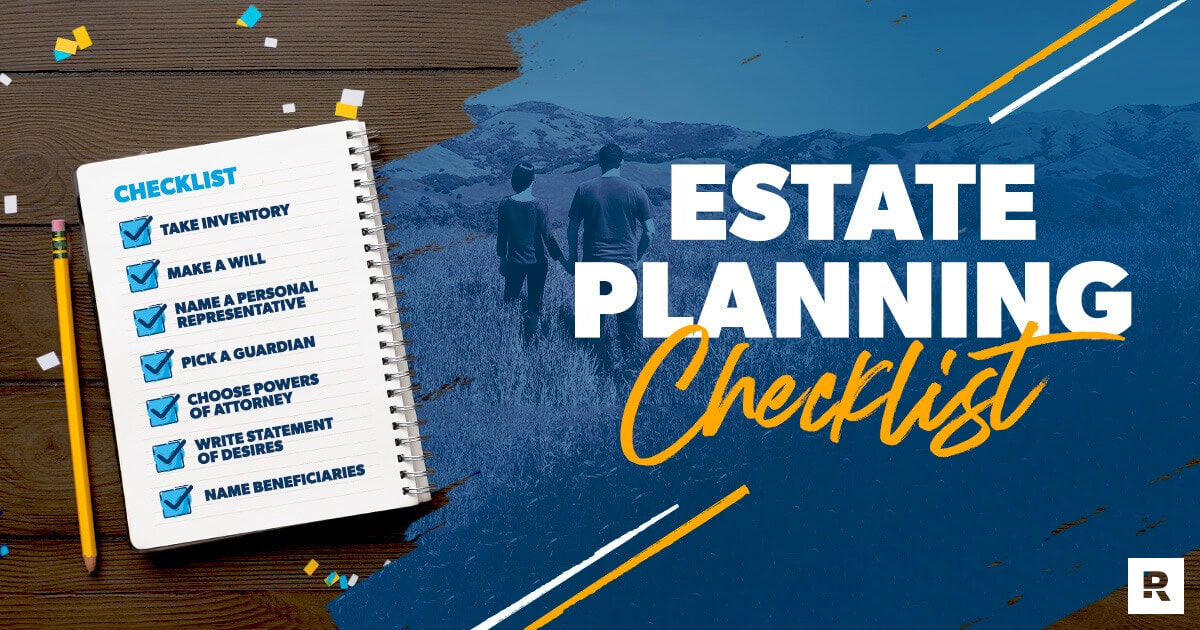
An estate planning checklist isn’t just for Downton Abbey types with multiple mansions and yachts. Sure, those folks need a plan, but even if your net worth is camped out on zero as you’re paying down debt or building up some wealth, estate planning is still for you.
Actually, if your net worth is a bit on the slim side, it will be much easier for you to set up your estate plan. But whether your net worth is big or small, having an estate plan is definitely not something to put off.
What Is Estate Planning?
So, what exactly is estate planning? Estate planning is just a fancy legal-ish term for what you want to happen to your money and your stuff when you die or become disabled. It also includes specifics about your medical wishes and who you want to take care of your kids or pets. It’s made up of documents like:
- A will
- Letter of instruction
- Financial power of attorney
- Medical power of attorney
- Beneficiary designations
Your estate plan can be simple or complicated. But if you go without an estate plan, a lot of things could happen that you never wanted—like the state taking your stuff when you’d much rather your deserving loved ones get it! So, if you care about controlling who gets what (and we know you do), having a plan isn’t really optional.
Here’s the great thing about estate planning. You don’t necessarily need to pay a lawyer stacks of cash to draw one up. Most people can create their estate plan entirely online in the comfort of their favorite armchair. However, if you do have a large estate, hiring an estate planning attorney might help with all the ins and outs.
There are plenty of ways a solid estate plan can benefit you and your family. First, taking the time to put your plan together shows you care enough about your loved ones to look after them when you’re gone. It can also be a good way to minimize estate taxes. Plus, it gives you a legacy you can be proud of and peace of mind knowing the wealth you’ve worked hard to build ends up exactly where you want it to.
But knowing how to set up an estate plan can be like trying to untangle those Christmas cord lights after they’ve been in the closet all year. That’s why we created this estate planning checklist. It’ll give you everything you need to get your life organized and bring your estate planning skills up from rookie to pro. Let’s jump in.
- Make a List of Your Assets
- Consider Your Needs
- Get a Will
- Choose the People You Want in Your Estate Plan
- Assign Items to Your Beneficiaries
- Write a Letter of Instruction
- Communicate
- Make Copies and Distribute Your Documents
- Store Your Documents
Download Our Free Estate Planning Checklist
Our estate planning checklist will help you complete everything you need in order to complete a good estate plan.
1. Make a List of Your Assets
Take out your laptop or a pen and paper and make a list of your assets—everything you own. Start thinking about who you want to give them to. If you’re married, this could be as easy as listing your spouse as the beneficiary of all your stuff. (A beneficiary is a person you’re giving something to—they’re benefitting from your gift.) These gifts can be money, brokerage accounts, or things like a house or car. Here’s a good way to organize everything:
Physical Assets
A good question to ask yourself is, Does it have a title?
Save 10% on your will with the RAMSEY10 promo code
If the answer is yes, it’s most likely a physical asset. Here’s a list of typical ones:
- Cars
- Homes
- Boats
- RVs
- Property
Physical assets can also include sentimental things (that might not have a title). Like, do you want to leave your favorite fishing pole to your son? Or that special painting that’s been in the family forever—do you want to leave it to your niece the art lover?
Financial Assets
Financial assets are things like:
- Money in checking or savings accounts
- Mutual funds and retirement accounts
- HSAs (Health Savings Accounts)
- Businesses
- Life insurance policies
Digital Assets
Here’s one that’s a little less obvious. Most people don’t realize those family videos they’ve been creating with their smartphone are considered assets. But trust us, they are. Here are some common ones:
- PDFs
- Videos
- Presentations
- Audio Files
- Images
- Spreadsheets
- Graphics
- Design Files
Add Co-Owners to Your Assets
Did you know you can add someone to the title of an asset, like a car? Yep—and it can be a good way to make sure it passes to the right person. Just make sure to list the person you want to add as a “joint tenant” with the “right of survivorship” on the title.
There are two downsides to this though: 1) If you ever want to sell the asset, or connect it in any way to a loan, the co-owner has to agree. They co-own it. 2) If the value of the asset is over a certain amount, they could get hit with a federal gift tax when it transfers to them. That said, you should still consider adding co-owners to some of your assets depending on your circumstances.
Once you’ve got everything listed, you’re ready to move on to the next step. And remember, even if you don’t have much, that’s fine. It just means your estate plan will be easier to create.
2. Consider Your Needs
It’s time to focus on you! Try to think about your life from a bird’s-eye view. Do you need to consult an attorney who can legally untangle your possessions? Or do you think using an online will package (written by attorneys) is enough?
We put together a quick quiz to help you decide if an estate attorney or an online will is the best choice for your situation. It only takes five minutes, and it’s free.
Here’s something else to think about. Online wills are perfect for 95% of the population, but if your estate is over $1 million (nice work BTW!), you may want to look at a living trust instead of a will. A living trust transfers your money and assets into a trust while you’re still alive. Your property is transferred to the trust, and you act as the trustee who controls it. This can be a good way to minimize estate taxes and help avoid probate court.
3. Get a Will
If you’ve decided that creating a will is the right decision for you, it’s time to actually make one.
But first, in case you’re wondering how your will fits into the estate planning process, think of it like this: Will preparation and creation is part of the estate planning process. Your will doesn’t replace estate planning—it’s a piece of it.
Let’s get started!
What Type of Will Do You Need?
Before you can create a will, first you need to figure out which type of will is right for you. Believe it or not, there are different types of wills for all kinds of situations. Here’s a breakdown:
- Simple wills
- Mirror wills
- Joint wills
- Living wills
- Holographic wills
- Nuncupative wills
- Deathbed wills
- Testamentary trusts
Don’t let all those options overwhelm you. A simple will does the job for almost everyone. And if you’re married, get a mirror will for your spouse. A mirror will is drafted to be almost identical to your will, but it’ll have your spouse’s name as the testator (the person making the will). Not only can mirror wills save your loved ones from some legal headaches down the road, but they also give you and your spouse freedom to give away your personal belongings to whoever you want.
Create Your Will
Creating your will is way easier and much less expensive than it used to be. It’s now 100% legit to create a legally binding, state-specific will online without paying expensive attorney fees. Most people just need to fill in a few blank fields on a digital form to generate a valid will in minutes.
If you’re wary of creating your will online, without a lawyer, don’t be. Here’s why. Legitimate online will forms are written by lawyers. (We recommend Mama Bear Legal Forms.) That means that the legal requirements and language needed to make your will legally binding are already built into the forms. How smart is that?
After filling out the online will form, you’ll need to sign and date the printed form in front of two witnesses. Also, in most states, it’s not legally required to get your will notarized, but we recommend getting it notarized anyway for extra protection and efficiency after you’re gone.
That’s it!
4. Choose the People You Want in Your Estate Plan
The next step is to choose the right people to be part of your legacy after you’re gone. Here are some things to consider while you’re thinking about the people in your life:
Beneficiaries
Simply put, beneficiaries are the people you give your stuff to when you die. Your stuff can include all or some of your assets (money and other things you own). You can list more than one beneficiary, and it doesn’t have to be a relative. The important thing here is that if you don’t pick beneficiaries, some probate court decides who gets your stuff. Don’t let this happen!
Here's another tip—you should pick contingent beneficiaries. You need them in case something happens to the people you chose as your primary beneficiaries. (Think of the contingent list as a backup plan for your backup plan.) You never know what’s going to happen in life!
Executor
The executor (aka personal representative) is the person who makes sure all of the wishes you spell out in your will are met. Kind of the Fairy Godmother of estate planning. Choosing the right executor is a critical part of successfully planning your estate.
Think of that person in your life who has the time and know-how to manage every part of your estate. The executor will also need to be organized—they’re the ones who will handle your assets when you’re gone and make sure everything’s distributed according to your will.
Think it over carefully. Got someone in mind? Once you make your final decision, ask that person if they’re okay with being your executor, then add their name to your will.
Guardians for Dependent Children
Guardians are the people who would have legal custody of your kids and your kids’ property if you’re not around.
If you have minor children, spend some time thinking through who you’d like to take care of them when you’re gone. If you don’t name a guardian in your will, the courts will decide for you—and no one wants a court to decide something as important as guardianship for children.
Guardians for Pets
Pets can bring so much joy to people’s lives—to many, pets are as important to them as children. Some people even call them their fur babies. If you have someone in mind to care for a pet when you die, name that person in your will.
Trusted Advisor
Maybe you think your executor will need help sorting through the complexities of your will. If so, you have the option of naming a trusted advisor. That can be an accountant to help the executor handle day-to-day financial responsibilities, or even a family member or friend to help with the process. It’s completely up to you whether you do this.
Medical Power of Attorney
Medical power of attorney (aka medical POA or health POA) is someone you choose to make medical decisions on your behalf. It usually comes into play in life-or-death situations. Your medical POA should be someone you have an enormous amount of trust in, obviously. They could be called on to make a critical decision for you if you can’t speak for yourself.
The medical POA should be very familiar with your own opinions about medical decisions. For example, if you’re in a coma, they should know exactly what you want—and don’t want—done.
Financial Power of Attorney
Next up? Deciding who you want to give financial power of attorney. As you can guess from the title, it should be someone you trust enough to make money decisions for you when you can’t.
Someday, if you’re laid up and unable to make financial choices—and the truth is that can happen to anyone—you can have peace of mind knowing that you appointed someone to manage your finances for you (paying your bills for example).
5. Assign Items to Your Beneficiaries
Remember the people you named as beneficiaries in the previous step? Well now it’s time to decide who gets what. Planning gifts is fun, right? Here we go!
Retirement Accounts
The first thing to do is review the beneficiaries you named on your retirement accounts and/or pension plan. If you already specified your spouse (assuming they’re still living) as the recipient of your retirement account when you die, this one’s easy. You have nothing to do but verify their name is listed. Easy!
But if your spouse is no longer living, think about who you want to leave your retirement savings to. You could give a set dollar amount (or a percentage) to each of your children. Another option is to leave it all to a friend. What about a charity? It’s completely up to you.
Whatever you decide, assign beneficiaries to your retirement accounts now. Otherwise, the courts will decide for you after you’re gone. (How often do you get to call all the shots like this? Pretty cool, right?)
Life Insurance Policies
Now it’s time to check who gets the payout from your life insurance policy. When you first purchased it, you had the option to specify one or multiple beneficiaries—the people who will receive the death benefit when you pass away.
Are your choices still accurate? Did you have a life event (marriage? new baby? divorce? move?) since you first bought the policy? Are the right people and addresses listed? Now’s the time to check.
Beneficiaries for All Other Assets
This one’s probably obvious by now. Pick a beneficiary for any other assets you have (checking account, savings account, money market account, etc.) that need to be cashed out after you’re gone.
6. Write a Letter of Instruction
A letter of instruction (aka a letter of intent) is a great way to make things easier on your family after you’re gone. You can provide personal instructions that aren’t in your will for anything you want your loved ones to know.
For example, does anyone know what clothes you want to be buried in? Or the passwords and PIN numbers for your online accounts? Maybe you already know how you want your obituary written (hey, some people think about this stuff!). These are the types of things you can include in your letter of instruction.
Okay, so now you’ve got your will and your letter of instruction. Great job! But wills don’t actually cover everything. And sometimes there’s an easier way to give stuff to your family and friends at your death. That’s what we’ll look at next.
7. Communicate
Believe it or not, just talking about your final wishes with your loves ones is an important part of the legacy you’re leaving. Unless you’ve got a family full of mind readers, they need to know what you decided. And why.
We’ve already looked at the importance of your executor, guardians and powers of attorney. But have you actually discussed the roles with any of these people? Be sure to let them know what’s involved in the role and find out if they’re up to it.
8. Make Copies and Distribute Your Documents
You’ve made some tough emotional decisions. Now it’s time to make copies of all your documents. Here’s a reminder list:
- Last will and testament
- Letter of instruction
- Medical power of attorney
- Financial power of attorney
Make sure you give a copy of each to your executor and your spouse. And don’t forget yourself!
9. Store Your Documents
The best way to make sure your estate planning documents are in a safe place is by creating a legacy drawer.
A legacy drawer includes all of the important information your family needs if something happens to you. Make sure someone knows about the drawer!
Best Place to Start
So, there you have it. Your estate planning checklist is complete. Congrats! You made it through. Now take a deep breath . . . and give yourself a pat on the back (you earned it).
Estate planning success is right around the corner!
Depending on your situation, you may be wondering about your next steps as you plan your own estate. Check out a few ideas here.
Next Steps
- Still not convinced you need a will? Learn more about wills and why you definitely need one.
- Use these six steps to get started estate planning.
- Take our quiz below to figure out whether an online will works for you.
- Start your online will with RamseyTrusted provider Mama Bear Legal Forms.
Complete Last Will & Testament Package for One Person
Includes:
- Last Will & Testament
- Health Power of Attorney
- Finance Power of Attorney
Complete Last Will & Testament Package for Married Couples
Includes:
- Two Last Will & Testaments
- Two Health Powers of Attorney
- Two Finance Powers of Attorney
Interested in learning more about estate planning?
Sign up to receive helpful guidance and tools.




